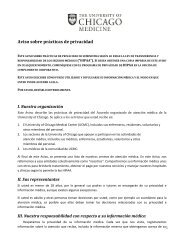Theme: Cell Motility, Cell-Cell Adhesion, and MetastasisAndy Minn, MD, PhDAssistant Professor of Radiation and Cellular OncologyMetastasis is responsible for the vast majority ofbreast cancer-related deaths. At present, the bestway to cure breast cancer is to remove the diseaseprior to metastasis. Occasionally, surgery and localradiation are not sufficient to cure the disease becauseof the microscopic spread of cancer to other organs.In this situation, chemotherapy is administeredafter surgery, but with limited success because asignificant proportion of women with such diseasemanifests chemotherapy resistance and go on todevelop clinically significant metastatic disease(stage IV) months or years later. Thus, the window ofopportunity to cure breast cancer rapidly closes oncethe disease spreads. Attempts to re-open this windowhave been unsuccessful, leading to the prevailingwisdom that metastasis is incurable.A spontaneous intestinal tumor from Apc Min/+ mice stained with anti-beta-cateninantibody (green) and Hoechst dye (blue) to label the nuclei. In the normal intestinalmucosa (to the right of the image), beta-catenin is localized to the basolateralsurface of the epithelial cells where it mediates cell-cell interactions via the adherensjunction. In these tumors with loss of heterozygosity of the Apc tumor suppressor,beta-catenin accumulates in the cytoplasm and nuclei of the tumor cells (center ofimage) and regulates the transcription of tumor-associated target genes.(Image by K. Goss)For breast cancer, classical progression modelsshare the theme that genes controlling metastasisand resistance are stochastically acquired throughmutation. These models dictate that metastatic potential and resistance are cell-intrinsic and passed between cells, tumors,and disease sites, which has given rise to a common perception that cancer is uncontrollable once distant spread has occurred.In contrast to this reasoning, Dr. Minn’s laboratory hypothesizes the existence of metastases that are biologically limited incolonization, spread, and virulence and, therefore, represent what is called an oligometastatic state. His team envisions thatoligometastases are more likely to be sensitive to therapy due to a mechanistic coupling between genes that drive metastasis andthose that drive treatment resistance. The aims of Dr. Minn’s research are to characterize and mechanistically define genes andpathways that both mark and mediate metastasis and its resistance to treatment.Previous work in the laboratory identified a Lung Metastasis Gene Signature (LMS) that experimentally mediates and clinicallypredicts aggressive metastasis. Although the LMS accounts for a significant percentage of metastases among breast cancerpatients that develop distant relapse, the majority of patients with LMS-expressing primary cancers do not metastasize. Thissuggests an additional level of regulation and complexity that may occur subsequent to successful distant colonization.To understand mechanisms of treatment resistance better, Dr. Minn’s laboratory is collaborating with Dr. Ralph Weichselbaum(Clinical and Experimental Therapeutics Program) to study a gene expression signature for DNA damage resistance, denotedthe Interferon-Related DNA Damage Resistance Signature, or IRDS. Several key IRDS genes mediate experimental resistanceto chemotherapy and radiation, and their known involvement in interferon responses suggest unanticipated but interestingbiology. The team has recently shown that the IRDS is expressed in half of primary human cancers of various types and mayaccount for the majority of breast cancer patients with resistance to chemotherapy and radiation.By focusing on the LMS and IRDS as two biologically and clinically relevant models for metastasis and treatment resistance, amajor research goal of Dr. Minn’s laboratory is to explore the mechanistic underpinnings of why progression toward metastasisoften goes hand-in-hand with progression toward treatment resistance. Consistent with this notion, the majority of LMSexpressingprimary breast cancers also express the IRDS. Interestingly, the laboratory has discovered that tumor stroma maybe critically involved in these processes. Efforts that leverage a systems biology approach to understand important heterotypic12UCCRC SCIENTIFIC REPORT 2009
interactions, paracrine factors, and intracellular signaling events that govern the biology of the each signature are currentlyunderway. Ultimately, an important goal is to determine whether early detection of metastasis, similar to early detectionof primary cancer, can result in a biologically-definable period whereby immature tumor-microenvironmental interactionslimit metastatic colonization, spread, and resistance to therapy. If so, a subset of patients with metastasis may be amenable toaggressive and perhaps curative treatment.Carrie Rinker-Schaeffer, PhDAssociate Professor of SurgeryCell Signaling &Gene RegulationCancer metastasis is a complex, dynamic process that begins with dissemination of cells from the primary tumor andculminates in the formation of clinically detectable, overt metastases at one or more discontinuous secondary sites. Theprocess of invasion has been well studied, but the last steps in metastasis, metastatic colonization, remain largely unknown.Identifying pathways that control metastatic colonization may be critical for successful clinical management of cancerin both the metastatic and adjuvant settings. While genetic mutations or epigenetic changes may be required for cells toseparate and survive distant from the primary tumor, the environment within secondary tissues plays a substantial role indetermining whether disseminated cells survive and proliferate. Work in the Rinker-Schaeffer laboratory is focused on acritical unanswered question: Why do the majority of disseminated cells, which should be fully malignant, fail to proliferateimmediately at secondary sites, and how do these cells initiate growth and cause lethal disease? Over the past decade, thelaboratory has created unique model systems and developed biochemical tools to address this question mechanistically.This work is laying the foundation for the translational goal of identifying targets for inhibiting metastatic colonization andprolonging disease-free and overall survival.There is considerable interest in controlling the growth of cancer cells at metastatic sites. Therapeutic leads may be discernedby determining why disseminated cancer cells, which have molecular alterations that alter their growth properties, oftenlodge at target organs and persist as undetectable, or dormant disease. Many laboratories have worked on this question interms of angiogenesis, roles of oncogenes in conferring growth potential, or aspects of dormancy. The models used in thesestudies, however, did not enable the investigators to mechanistically interrogate effects on proliferation vs. apoptosis vs.quiescence in vivo. The Rinker-Schaeffer team chose to approach this problem from a different angle and use the unique toolsthey have developed over the past decade. The laboratory discovered that the stress-signaling kinase JNKK1/MKK4 cancontrol an early step in metastatic colonization and extended symptom-free survival in preclinical models of prostate andovarian cancers. Recent studies from the group support the hypothesis that activated JNKK1/MKK4 impairs proliferationof cells early in the course of metastatic colonization. It is remarkable that few, if any, studies have been conducted thatspecifically examine growth control of cells during metastatic colonization.The more intriguing question is how these cells ultimately bypass suppression and form overt metastases. Historically,fundamental tenets of metastasis biology dictate that acquisition of metastatic ability is the result of the “drive” of malignantcells towards growth. Thus it was predicted that bypass of suppression is simply the result of mutation-selection cycleswhich permanently inactivate JNKK1/MKK4 or members of its signaling cascade. Published data from the Rinker-Schaefferlaboratory challenge this paradigm and suggest that JNKK1-mediated suppression may be due to a reversible cell cycle arrestconcomitant with changes in JNKK1/MKK4 activation status. An exciting opportunity now exists to re-examine importantbut scattered literature on population-dependent behaviors of metastatic cells which have heretofore been refractory tomechanistic study. Understanding how a population of suppressed cells can adapt to its environment and initiate growthis critical to the development of adjuvant therapies that can be used in conjunction with local therapy to delay the onset ofmetastases. Ongoing studies are aimed at understanding how activated JNKK1/MKK4 regulates proliferation of disseminatedcells and the global mechanism(s) by which suppressed cells ultimately bypass suppression.UCCRC SCIENTIFIC REPORT 200913
- Page 1 and 2: Collaborate Explore Discover2008-20
- Page 3 and 4: Immunology& CancerClinical & Experi
- Page 6 and 7: AdministrationUCCRC Executive Commi
- Page 8 and 9: Program 1Cell Signaling and Gene Re
- Page 10 and 11: 8MembersInvestigator*Kenneth Alexan
- Page 12 and 13: Theme: Molecular Mechanisms of Apop
- Page 16 and 17: Theme: Systems Biology and Genetic
- Page 18 and 19: Theme: Developmental BiologyIlaria
- Page 20 and 21: Additional Program Highlights*Resea
- Page 22 and 23: Selected Publications* : Intraprogr
- Page 24 and 25: Lang D, Mascarenhas JB, Powell SK,
- Page 26 and 27: Granovsky AE, Rosner MR. Raf kinase
- Page 28 and 29: Selected Major Grants and AwardsThe
- Page 30 and 31: Program 2Molecular Genetics and Hem
- Page 32 and 33: MembersInvestigator*John Anastasi M
- Page 34 and 35: Theme: Pathogenesis of LeukemiaDoro
- Page 36 and 37: The ultimate goals of the laborator
- Page 38 and 39: Additional Program Highlights*Resea
- Page 40 and 41: Selected Publications* : Intraprogr
- Page 42 and 43: * Knight JA, Skol AD, Shinde A, Has
- Page 44 and 45: * # Gordon MK, Sher D, Karrison T,
- Page 46 and 47: Program 3Immunology and CancerScann
- Page 48 and 49: MembersInvestigator*Erin Adams PhDM
- Page 50 and 51: and αβ TCRs are well known, the l
- Page 52 and 53: transcriptional profile in the tumo
- Page 54 and 55: ••The impact of regulatory T ce
- Page 56 and 57: Selected Publications* : Intraprogr
- Page 58 and 59: Storb, Ursula MD# Longerich S, Orel
- Page 60 and 61: Dr. Susan Cohn with a patientProgra
- Page 62 and 63: 60MembersInvestigator*Douglas Bisho
- Page 64 and 65:
compared to mice treated with IP ci
- Page 66 and 67:
Using a structure-based rationale,
- Page 68 and 69:
incorporation of other genetic elem
- Page 70 and 71:
Additional Program Highlights*Resea
- Page 72 and 73:
Selected Publications* : Intraprogr
- Page 74 and 75:
Hart, John MD* # Dougherty U, Sehde
- Page 76 and 77:
Nanda, Rita MD# Wei M, Xu J, Dignam
- Page 78 and 79:
# Yang C, Karczmar GS, Medved M, Ot
- Page 80 and 81:
Selected Major Grants and AwardsThe
- Page 82 and 83:
Program 5Advanced Imaging
- Page 84 and 85:
MembersInvestigator*Hiroyuki Abe MD
- Page 86 and 87:
in as many as 86% of the measuremen
- Page 88 and 89:
investigators and engineers from co
- Page 90 and 91:
have important clinical implication
- Page 92 and 93:
Theme: Image-Guided TherapyCharles
- Page 94 and 95:
irradiated to a variety of doses ne
- Page 96 and 97:
Selected Publications* : Intraprogr
- Page 98 and 99:
* Jansen SA, Fan X, Karczmar GS, Ab
- Page 100 and 101:
Program 6Cancer Risk and Prevention
- Page 102 and 103:
MembersInvestigator*Habibul Ahsan M
- Page 104 and 105:
to prostate cancer. The work has ma
- Page 106 and 107:
Dr. Ahsan’s team showed that sele
- Page 108 and 109:
Theme: Psychological and Bio-Behavi
- Page 110 and 111:
Daniel McGehee, PhDAssociate Profes
- Page 112 and 113:
Sarah Gehlert, PhDProfessor of the
- Page 114 and 115:
Selected New Funding•• Lisa San
- Page 116 and 117:
Selected Publications* : Intraprogr
- Page 118 and 119:
Gehlert, Sarah PhD* Gehlert S, Sohm
- Page 120 and 121:
Olopade, Olufunmilayo MBBS* Bradbur
- Page 122 and 123:
Clinical Trials ActivityDr. Alessan
- Page 124 and 125:
The clinical trials activity of the
- Page 126 and 127:
Shared ResourcesDr. Vytas Bindokas
- Page 128 and 129:
Biostatistics Core FacilityScientif
- Page 130 and 131:
collaborations. The Facility mainta
- Page 132 and 133:
The services provided include:•
- Page 134 and 135:
Other Resources and Centers
- Page 136 and 137:
Cancer Resource CenterThe UCCRC off
- Page 138 and 139:
CECOS has successfully developed an
- Page 140 and 141:
Committee on ImmunologyThe Committe
- Page 142 and 143:
The University of Chicago Medical C
- Page 144 and 145:
HighlightsThe Gwen and Jules Knapp
- Page 146 and 147:
Leukemia and Lymphoma Society Speci
- Page 148 and 149:
Institute for Genomics and Systems
- Page 150 and 151:
Systems Biology Approach for the St
- Page 152 and 153:
Immunology and Cancer ProgramMaria-
- Page 154 and 155:
Cancer Risk and Prevention ProgramA
- Page 156:
www.uccrc.uchicago.eduEditor: Hoyee
















